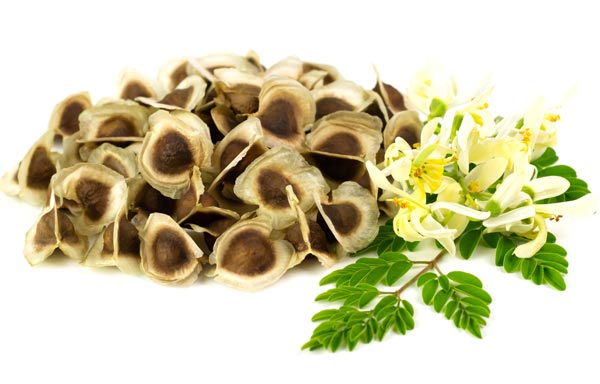Moringa Oleifera is also known as the “Miracle Tree”, “the Tree of Life” or “the Drumstick Tree”. It is one of the most nutrient dense plants on our planet. It is a native of the southern foothills of the Himalayas, being fast growing and drought resistant. Well known for its nutritional and healing properties it is eaten regularly as a vegetable in Asia and Africa. All parts of the tree are technically edible, but the leaves, seeds and seed pods are most commonly used. The leaves are long and feathery, and along with the blossoms are used as infusion. The seeds can be roasted and eaten in the same way as peanuts. The powdered seeds are extremely effective as a water purifier. Moringa leaves and seeds are packed with twenty-seven vitamins, nine essential amino acids, forty-six antioxidants, many minerals and high concentration of protein. In view of these facts, it is being investigated as a sustainable remedy for combatting malnutrition.

Moringa has been used as a traditional medicine for thousands of years and is referred to as a panacea as it can be used to cure more than three hundred diseases! Moringa is a storehouse of minerals like calcium, potassium, zinc magnesium iron and copper to name but a few. It has a wealth of vitamins such as beta-carotene, vitamin B, such as folic acid and also vitamins C, D, and E are present along with many phytochemicals. Also present are anticancer agents like glucosinolates, sterols, tannins and flavonoids. Polyunsaturated fatty acids as those in flax oil and fish oil abound, which have the ability to control cholesterol in addition to the antioxidants.
Moringa has also been shown to cure both type I and type II diabetes. Type I diabetes is when patients do not produce enough insulin to maintain blood sugar levels. Type II diabetes may be due to Beta cell dysfunction, which affects the body’s ability to sense glucose levels. Several studies have shown that Moringa can act as an antidiabetic agent in both cases.
Cancer is becoming more and more prevalent where there are no specific reasons for it to develop. Cancer treatments are extremely invasive, harsh and have many side effects which are proving to be nearly as destructive as the cancer itself. Studies have shown that Moringa can inhibit the growth of cancer cells. Further studies have shown that moringa can be used as an anti-cancer agent that is natural, reliable and safe. Recent research papers show that Moringa can induce reactive oxidation species {ROS} in cancer cells [i.e. chemically reactive molecules containing oxygen which damages cells]. Research shows that these molecules produced by moringa are specific and target only cancer cells.
Moringa can be used as a neuro protectant. The antioxidants from moringa can be used to treat dementia, Alzheimer’s disease, neuropathic pain, depression and improve brain function and memory by increasing the connection between the neurons. The antioxidants enhance the work of the neurotransmitter acetylcholine which is responsible for cognitive functions like memory and learning and especially brain processes affecting attention and learning.
Moringa has also been shown in a study to increase protein in the diet and decrease levels of urea and creatinine in the blood. Lowering creatinine levels prevents renal dysfunction related to kidney disease. Moringa has demonstrated an ability to decrease acidity in gastric ulcers by about 80% using doses of 500mg. The effect of Moringa being added to the diet has proved to be a potent therapy for arthritis and a reduction in the rheumatoid factor. This indicates that the anti-inflammatory action is powerful and far reaching.
Many other studies have proved that Moringa has numerous positive effects on skin wounds, hair health, edema, non-alcoholic fatty liver disease, and colon cancer. A research paper in 2022 discovered Moringa as effective in fighting Staphylococcus and E. coli. Due to its antioxidant and anti-inflammatory properties, it can protect cardiovascular health and lower blood pressure, relieve asthma and bronchial constriction and airway inflammation.
In conclusion Moringa Oleifera emerges as a remarkable superfood with profound potential to address global health and nutritional challenges. Its rich profile of essential nutrients and antioxidants and bioactive compounds support its role in combating malnutrition, enhancing immune function and mitigating chronic diseases. From its anti-inflammatory and anti-microbial properties to its capacity to improve metabolic and mental health, Moringa offers versatile solutions for paving the way for a healthier and more hopeful outlook for the way forward to naturally heal and nourish us today and in the future.
Food Science and Human wellness Volume 5 Issue 2 June 2016 pages 49-56.
Moringa Oleifera: A review on nutritive importance and its medical application: Lakshmipriya Gopalakrishnan, Kruthi Doriya, Devarai Santhosh Kumar.
WRITTEN BY: NATHALIE McNEILL, FOUNTAIN HEAD HEALTH STORE, FERGUS

